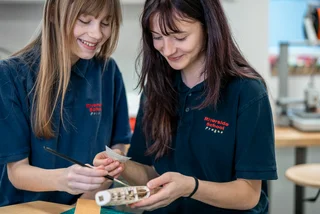Written by Stephanie Kay
Babymoons Prenatal & Parenting
for Expats.cz
Pregnancy is a time of choices. Amongst the initial choices you will need to make are where to have your baby and who will provide your care during pregnancy, labour and the immediate postnatal period.
It is bewildering enough for a woman who becomes pregnant in her own country, but living abroad creates a whole different perspective and there is a large choice of birthing venues and leading health professionals to pick from. So where do you begin?
Some Factors to Consider:
Obstetricians in the Czech Republic and especially Prague area are usually affiliated to a particular maternity hospital or clinic and as a rule are unable to care for their labouring women anywhere else. So choosing a hospital first will limit your choice of obstetrician and vice versa.
Many women choose their obstetrician through recommendations from friends, colleagues or other doctors. While this can be useful, it is worth noting that personal opinions are generally subjective and what suits one person may not neccessarily suit another.
Continuity of carer is important to most couples. The ideal scenario would be to consult one trusted person who provides all your prenatal care, be with you throughout labour, deliver your baby then continue your care during the postnatal period. Find out how big a part your obstetrician will play in your labour. Many commit to being with women throughout whilst others come only for the birth. A few may not show at all. Check his or her schedule for holidays, conferences etc, does anything come close to your due date? An obstetrician being on vacation is not a valid reason for medically inducing birth. Who will deliver your baby in the absence of your obstetrician? Will you get to meet him or her beforehand? If this is important to you, make sure these questions get asked at the first visit.
It is important to establish a good comfortable relationship with your obstetrician so that you can be confident that you are communicating on an equal level. Do not be afraid to challenge set policy if you feel it will not be in you or your baby`s best interests, Most doctors will welcome the chance to involve you more in the decision making process and although some hospital policies seem to be set in stone, there is always room for compromise. Do not always expect to be volunteered information. You must be proactive and ask the questions. Always try to attend prenatal appointments together. I dont know that there is any research evidence to back this up but women consistently report a higher level of satisfaction with their prenatal care if their partner accompanies them. Maybe the whole process is less intimidating and giving support to each other can be empowering. Certainly two people are more likely to remember to bring up the burning issues.
If you feel that for whatever reason you wish to change to a different obstetrician then this is possible at any stage in pregnancy and in fact, as is usually the case with all forms of private healthcare, quite a common and accepted practice.
Midwives do not generally deliver babies although they are trained to do so. A midwife or obstetric nurse will play a large part in providing care during labour but you may not get an opportunity to meet her beforehand.
The vast majority of births take place in hospital. Homebirth is rare but nontheless still an option. Contact the midwives at A- Centrum (www.materstvi.cz) for more information. They also offer a variety of prenatal preparation classes in Czech.
Women are expected to stay in hospital for several days following birth. One reason for this is because postnatal care in the community is scarce although you can always arrange to be visited at home by your obstetrician and/or paediatrician.
Medical insurance
What does your policy cover you for? Will you need to upgrade your policy in order to be able to afford your first choice of obstetrician? If you want to shop around and visit a few before making up your mind, will your policy cover these extra visits? It may be worth giving insurance matters serious thought even before considering a pregnancy.
Potential language barriers
Most doctors speak a variety of languages although midwives and other medical staff may only understand czech.
Accessibility
Where do you live in relation to maternity care? Will you be able to get to prenatal check ups easily? What about getting to hospital in labour?
The Czech Republic has a sizeable transient expatriate population which means that couples may not arrive in the country until late pregnancy with little time to research the options. In this instance, try to do your homework beforehand as it may not be possible to physically shop around. Look at the factors that are important to you and discover as much information as possible before you arrive to help narrow your choices. The internet is a useful tool. www.expats.cz provides general information on services as well as personal anecdotal recommendations. Many hospitals have their own websites (usually only in Czech) and www.aperio.cz can provide a general overview of several of the most popular birthing venues.
Some couples decide to return to their home country for the birth. A Czech obstetrician can provide prenatal care until you depart and your medical notes handed on to whoever takes over your care.
The Importance of the Birth Environment
Peoples lives are punctuated by major events that require meticulous planning. Its amazing how much detail goes into arranging birthday parties, holidays and weddings, yet throughout the world when it comes to giving birth, many of us just seem to accept what is on offer.
In 2004, the British charity “National Childbirth Trust” conducted a survey that looked into labour ward environment and canvassed women on what they wanted from the place in which their babies were born. The results indicated overwhelmely that women viewed the environment in which they gave birth with extreme importance, believing that this had a significant impact on whether or not their experience of labour was good or bad.
Women wanted:
– to have a clean room with en suite facilities
– to be able to move around freely in labour
– to have comfortable furniture
– to have space and facilities for companions
– access to a bath tub and/or water
– equipment to provide support in a range of positions
– to be able to control who entered the room, in other words, retain some degree of privacy
During normal labour, a woman`s womb contracts and her cervix (neck of womb) gradually opens. The cervix, like vagina and rectum, is a sphincter and only able to function properly if the conditions are right. Think how difficult it would be to make love in a noisy, brightly lit room where strangers barge in without knocking. Imagine sitting on a toilet in a room full of people, all looking at you, waiting for you to go… ! Think about where you would like to give birth if you REALLY had a choice. Down by the ocean maybe or in a darkened quiet corner of woodland, or possibly even your own home.Certainly the survey highlighted a couple`s need to feel welcome and secure in an environment that is more like home than a traditional hospital ward.
How easy is this to achieve here in the Czech Republic? Contrary to popular belief, maternity units are not the same and it is highly recommended that couples visit several before making the final selection. When you begin prenatal care with an obstetrician, plan to visit the hospital he works from as soon as possible. Your doctor may show you around personally or designate a nurse that speaks your language. If your czech is good enough, book yourselves on to the next public group tour.
When you visit maternity units, try to imagine yourselves using the facility in a labouring situation (easier to do if you already have experience of giving birth).
If you are disappointed by what you have seen on the tour, dont rush to change your obstetrician. Look at others but also think about how you can adapt the environment. Find out what is provided by the hospital and what you might want to bring along from home in order to make you both feel more at ease. It is possible for women to obtain shared care, consulting one obstetrician during pregnancy for prenatal check ups knowing that they will give birth in their chosen maternity unit where someone else will care for them in labour. This is far from ideal, but a compromise nontheless.
It is not recommended to put off the visit until labour starts. It has been known for couples to feel so uncomfortable that they choose to transfer to a different hospital…in labour! This is definately guaranteed to send stress levels soaring.
Things to Look Out For on the Hospital Tour
– What is your immediate impression?
– Is the room clean and welcoming?
– How much privacy is there? Will you be sharing a room with other labouring women? Is there a curtain screening the door?
– Are there en suite facilities?
– How much space will you have for movement?
– What facilities/equipment are available to assist mobility and comfort both for you and your partner? Look for subdued lighting, temperature control, facilities for making drinks, facilities for playing music, extra chair, pillows, bean bags, birth balls etc
– Is medical equipment visible or hidden away?
Questions You May Wish to Ask During Prenatal Visits or During Your Hospital Tour
The questions below are a guideline only. I doubt that anyone will need to ask every single question but it might help as a trigger to getting the information that is really important to you and/or making a birth plan.
– How many babies on average are born in this hospital each year?
– How many births are induced?
– Why might you recommend inducing the birth?
– How many women opt for epidural as pain relief in labour?
– Do you offer mobile epidurals?
– Are epidurals available 24 hours a day?
– What other forms of pain relief are available?
– What equipment is available to help us through labour? (birth stool, ball etc)
Do you encourage the use of alternative labour therapies – (hypnosis, homeopathy, aromatherapy etc)
– What is your annual rate for caesarean cection and how does this figure compare with previous years?
– How many caesareans are planned and how many are performed as an emergency?
– How often do you perform episiotomy? Can I opt not to have this procedure?
– Does your hospital have an admission policy for electronic fetal monitoring? If so, for how long?
– Do you use continuous monitoring for all or some women?
– Can I opt not to be monitored at all?
– For what reasons might women have an intra venous drip or cannula inserted on admission?
– Do you allow more than one person to accompany women in labour? Do labour supporters (including Dad) need to pay a fee for being there? If so, how much and where do we pay?
– Does your unit have a policy of shaving women for birth?
– Does your unit routinely offer enemas on admission?
– Does your unit offer water birth?
– Are women encouraged to use water in labour?
– Are women allowed to eat and drink in labour? Will the hospital provide food and drink for both of us or only the mother?
– What is the instrumental birth rate? Are forceps or ventouse the method of choice?
– If we arrive at hospital during the night, can we use the normal entrance?
– I may decide to use a TENS unit to help me in labour (Transcutaneous electrical nerve stimulation – a form of non-invasive pain relief in labour but not at all common in Czech Republic). Will I be able to continue to use this once I arrive at hospital in labour?
– Do you allow freedom of movement throughout labour?
– Can women choose a position for delivery?
– If we wish, can we opt for a natural third stage?
– Will my doctor care for me in labour and deliver my baby? Will he/she be available throughout my labour? What are the chances of being cared for by a doctor we have never met?
– How many of the hospital staff will be able to understand us if we cannot speak Czech?
– What will the hospital provide for me and my baby (diapers, baby clothes, sanitary pads etc)? Does the hospital have a list of what we will need to bring from home?
– If our baby needed Special Care, what facilities are available?
– If this hospital is full when we arrive, would we have to go elsewhere? How would that work if I want my doctor to be with me in labour?
– Are any mothers or babies transferred to other specialist units? Why might this happen and where would they go?
– Who is the resident paediatrician? Will we get a chance to meet him or her before our baby is born?
– What tests and treatment will be offered to our baby before we go home? Can we opt not to have these?
– Will vitamin K be given to my baby after birth? Do you use oral drops or injection?
– How long after birth do women spend on delivery suite before being transferred to post natal ward?
– Is” rooming in” encouraged at all times or do staff sometimes take babies away to give mum a rest?
– What security measures does your unit have in place to protect babies?
– Can my partner stay with me overnight during the postnatal period?
– How much help and support is given for mothers choosing to breastfeed?
– How long must I stay in hospital after the birth? Could I stay longer or leave earlier if I wish?
– What aftercare (if any) is provided once we go home?
NB: All hospitals keep a record of statistics pertaining to birth. There may not be a published report available, but if you ask, you should be able to access the figures.












 Reading time: 10 minutes
Reading time: 10 minutes 


















